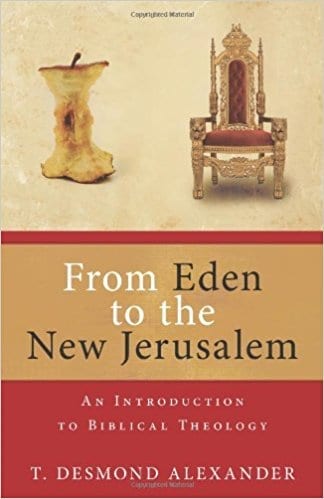
Alexander, T. Desmond,From Eden to the New Jerusalem, United States, Kregel Academic & Professional, October 13, 2009
In 2005, during my studies at the Moody Bible Institute, I was deeply moved by the scholarship and storyline of biblical theology. After understanding the differences between systematic theology and biblical theology, and respecting the rightful place and practice for each, I declared to my friends and family, “I am a biblical theologian.” While we all should be biblical in our study of theology, I was boldly stating that I would grow in my study and practice of biblical theology and seeks to uncover and articulate the unity of all the biblical texts taken together, resorting primarily to the categories of those texts themselves.[1]
 In T. Desmond Alexander’s, From Eden to the New Jerusalem, we see one of the best biblical theology synopses captured in writing. Alexander is a true scholar and biblical theologian himself, as proven in his other published works and articles. In this book, the author does what few could do in such a short work: he exposes the themes of the Bible from Genesis to revelation and presents a unity of the texts to present the Bible as a storyline of God establishing His presence on earth.
In T. Desmond Alexander’s, From Eden to the New Jerusalem, we see one of the best biblical theology synopses captured in writing. Alexander is a true scholar and biblical theologian himself, as proven in his other published works and articles. In this book, the author does what few could do in such a short work: he exposes the themes of the Bible from Genesis to revelation and presents a unity of the texts to present the Bible as a storyline of God establishing His presence on earth.
Alexander’s thesis and the aim are to reveal that the Bible, from Genesis to Revelation (or from “Eden to the New Jerusalem,” hence the title), is about God establishing His presence in the midst of humans. He presents the earth as God’s temple and the use of microcosm places for his presence to dwell, such as the tabernacle and the Temple (first and second). This then gives humans the purpose of ruling the earth on behalf of God and to minister within his “Temple.” I believe that Alexander accomplished the goal he set out to accomplish and proved his thesis well by showing biblically why the whole Bible is about God establishing His presence on earth.
Summary
The book is broken into eight sections or chapters, with the introduction being the first. The idea of God’s presence being established on earth is presented in the introduction where the author offers the idea that God’s presence is set in Genesis 1-3 and then is (re)manifest in a new way in Revelation 20-21 (10). Alexander then uses the subsequent chapters to support this idea; each section is placed in a literary chronology in order to support his thesis, starting with Old Testament theology and moving to Christ and the Revelation to John. The author gains intrigue with the reader by asking two fundamental questions: first, why was the earth created? And second, what is the reason for human existence? (10). The Author promises to be practical as well as theological and states, “Good theology always has pastoral implications” (11).
The author supports his thesis by presenting God establishing His presence throughout Scripture.
There is a story behind the greater story — a “Meta-story” — as the author calls it. The Bible gives us many great and compelling stories all throughout its pages, but we can be left to ask, “what is the central theme through them all?” And “How does this give us insight as to why the earth and all that is in it was created by God?” The author believes there is a “Temple” theme presented throughout Scripture. While this is only actually represented by a physical temple for a 400-year period of time-God used the physical Tabernacle, the Temple, Israel and eventually the church to make a way for his presence to be known on earth and worshiped or interacted with by man.
Alexander sees the intent of a dwelling place for God and man in the garden story of Genesis also represented in Revelation as God establishes the new Jerusalem. He writes, “By providing a closely matched beginning and end, the open chapters of Genesis and the final chapters of Revelation undoubtedly from the biblical meta-story” (14). The idea of God establishing His presence with the people is found all throughout the Bible, including in the coming of Jesus. In John 1:14, we are told that Jesus, as God, was “Pitching a tent” or tabernacle with us as He established God’s presence on earth (16).
The author supports his thesis by presenting the role of humans as keepers of God’s divine order for the sake of experiencing His divine presence.
As God created Eden in the past or will create the New Jerusalem in the future, we see a purpose He set out to fulfill: unhindered and manifest presence dwelling with humans. In both the past and future scenario, we see that humans have a role that must be fulfilled for God’s purposes to be met. In Eden, Adam and Eve were set to broaden the boundaries of God’s dwelling place. Even though they did not accomplish this and sinned, causing the mission to be aborted or changed, God kept His purposes and chose other means of fulfilling them. He explained the dwelling place of His presence through Israel in the Old Testament and through the Church in the New Testament until the present day. Just as God dwelt with humans in the Garden of Eden, so He dwells by the Holy Spirit in the hearts of men and women in the church today. The role of Adam and Eve was to broaden the boundaries of God’s dwelling place; similarly, those in the Church today are called to expand the boundaries of God’s Kingdom through their faith and obedient works.
Alexander explains that humans are to be priests and kings who fulfill God’s missions and carry out His desired duties within the world. As they do this, they will “Extended God’s temple and kingdom through the earth” (78). The Church today is reestablishing the sovereign rule of God in the world through their worship of Him, they obedience to Him and their work for Him. From Abraham to Melchizedek, we see a picture of God setting up an order with humans to establish the rule and presence of God on earth. This storyline climaxes when God Himself, through Jesus, takes on the flesh of a man to accomplish a great miracle for the people. With the inauguration of Jesus, we see a human, who is also God, step into serving righteously on behalf of all the people. Unlike earthly priests and kings, Jesus was perfect and able to provide for us “A New Exodus” to win us out of bondage and into a freedom only found in Christ (126).
The author supports his thesis by presenting Jesus as the final fulfillment of God’s promise to establish His presence with His creation.
The idea of the “New Exodus” leads us to the third strongest case the author makes for the biblical meta-narrative to be about God establishing His presence with humans. Just as God’s people was Israel under Egypt’s bondage, so those who are in the clinches of sin in desperate need of being freed. For God to be able to dwell with unholy men, the “ancient serpent” (Gen. 3:15) must be killed. The wrath of God must be appeased by the Passover Lamb – in Egypt, this was to save the physical lives of God’s chosen people; in metaphorical terms, the “Passover Lamb” of Christ saves those chosen by God to be saved. By the death of Christ, God’s people are atoned for, purified and sanctified. This act had to happen for God’s presence to established with His people; it happened through sacrifices in the Old Testament and a “Once and for all” Sacrifice in the New Testament, through Jesus Christ.
Not only did Jesus appease the wrath of God to forgive them of their sins, but He also ‘made them a kingdom and priests to our God and they shall reign on the earth’ (124). Just as there was a kingdom of priests in Israel, so there is also a “kingdom of priests” in the church, presenting and preserving the presence of God to the world (1 Peter 2:9). Alexander presents that the Lamb of Revelation 5 is to be seen as an allusion to the Passover Lamb of Exodus. The only limitation to this is that the first Passover Lamb was only about freeing Israelites from slavery; the final Passover Lamb in Christ was to bring all people of every nation to know the presence of God and the freedom that comes with His life in us (Rev. 7:9; John 10:10).
Critique of the Work
This is a hard work to critique as there seems to be little room for improvement. Alexander had a focused prescription through the entirety of His text. He set out to prove that the Bible’s storyline tells us of how God established His presence on Earth from Genesis to Revelation. He did this extremely well. There were little questions as to why any topic was relevant; every part seemed to fit and support his presentation of his argument.
One of the strengths of this book that sets it apart from other Biblical Theology books is the diversity of presentations to support His central idea. Each of the 7 supporting sections of the book identified a different facet of the argument. Each chapter was mutually exclusive but collectively they were comprehensively exhaustive on this topic. I only mentioned three or four ideas in this article as to why His thesis or aim was supported, but there are many other examples of this kind of support. The smaller points and variety of other stories mentioned make this book such a strong case for seeing God’s Word and God’s Purpose as unified and unchanging through time. I strongly recommend this book to all believers, but especially though who are looking to understand how the parts of the Bible make up the whole picture of God’s divine plan.
Conclusion and Recommendation
When I began my journey as a “Biblical Theologian” I was left to navigate a world of big books with big ideas and deep study. This book is smaller in size, only about 200 pages and an average read time of 5 hours and 24 minutes, according to Amazon’s Kindle stats. This is a small ask for anyone hoping to gain a larger understanding of God’s greater purpose and the cohesiveness of God’s unfolding story. This book gave me a greater understanding of how some Old Testament stories (Exodus, Passover, Babel, etc.) could be coupled with New Testament stories to see the way God redeemed His presence through the establishing and forgiving of His people.
The Gospel of Jesus Christ is also clear in these pages. Alexander’s work allowed me to see the way the climax of God’s story-namely the death and resurrection of Christ-was the ultimate fulfillment of God’s promise to establish a place for His presence with His people and a role for all of us to carry out while living within His purposes. I can honestly say that the Gospel of Jesus Christ was made sweeter to me through this work by T.D. Alexander, and for that, I am very grateful.
[1]From D. A. Carson, Systematic Theology and Biblical Theology, in New Dictionary of Biblical Theology, 100.







![Where is God when Discouragement Sets In? [Sermon]](https://joshweidmann.com/wp-content/uploads/2022/06/paola-chaaya-eAkjzXCU0p0-unsplash-180x135.jpg)

![How to Help Kids with Anxiety [video]](https://joshweidmann.com/wp-content/uploads/2020/07/mladen-borisov-RzbUUaP2JXY-unsplash-180x135.jpg)



